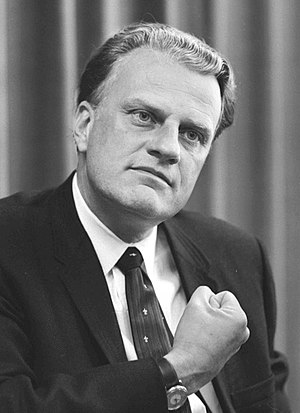
We preach Christ crucified. The cross is the focal point in the life and ministry of Jesus Christ. It was no afterthought or emergency measure with God. Christ was “the Lamb slain from the foundation of the world” [Revelation 3:8 KJV].
Share this quote:
Oh God, if You want me to preach, I will do it.
Share this quote:
As the people came to a desert place to hear John the Baptist proclaim, “Thus saith the Lord,” so [man] in his confusions, frustrations, and bewilderment will come to hear the minister who preaches with authority.
Share this quote:
I preach a Gospel not of despair but of hope for the individual, hope for society, and hope for the world.
Share this quote:
I am counting totally and completely on the Lord Jesus Christ, and not on Billy Graham. I am not going to heaven because I’ve read the Bible, nor because I’ve preached to a lot of people. I’m going to heaven because of what Christ did.
Share this quote:
I know that many of the things I have said from the Scriptures have offended some, but I cannot afford to tone down the message. As Paul said in 1 Corinthians 9:17, “I have a stewardship entrusted to me” (nasb), and that is to preach the pure and simple Gospel in whatever culture I am in.
Share this quote:
Many churches have their eyes on the culture instead of on Christ. Many pastors preach on common unity instead of calling the community to repent.
Share this quote:
When we preach or teach the Scriptures, we open the door for the Holy Spirit to do His work. God has not promised to bless oratory or clever preaching. He has promised to bless His Word.
Share this quote:
I must ask myself, “Billy Graham, are you prepared to meet the Master at any moment?” Yes, I am—but not because I have preached or tried to help people, but solely because I am trusting Christ as my Lord and Savior. Stop right now and ask yourself that question.
Share this quote:
Effective preaching must be biblical preaching, whether it is the exposition of a single word in the Bible, a text, or a chapter. The Word is what the Spirit uses.
Share this quote:
Double-mindedness means the faculty of holding two contradictory beliefs in one’s mind and accepting both of them. We talk out of both corners of our mouths at once.
Share this quote:
My visits to Hungary over the past twelve years absolutely fixed my conviction that God’s Holy Spirit was releasing a spiritual force in that part of the world that was bound to challenge the atheistic philosophy that had dominated nations in that region for decades.
Share this quote:
Only God knows when the alarm will sound, ending the work and ministry of evangelism as we have known it.
Share this quote:
I’ve never seen such a hunger in people for spiritual things . . .People realize the past is gone, the future is uncertain, and the present seems to be hopeless. As a result, many [in Moscow] were open to God.
Share this quote:
My visit to Auschwitz will certainly be one of the most unforgettable events of my life. It is a blot on the whole human race. It was the invention of minds so depraved and demonic that they defy any rational explanation. It reminds us of the terrible potential man has for violence and inhumanity.
Share this quote:
I wept more in Korea than in all the past several years put together. These experiences changed my life. I could never be quite the same again . . . I felt sadder, older. I felt as though I had gone in a boy and come out a man.
Share this quote:
Nations and civilizations rise, flourish for a time, and then decay. Eventually each comes to an end. This, because of sin, is the decree of history and the way of life on this planet.
Share this quote:
Each of us has a tongue and a voice. These instruments of speech can be used destructively or employed constructively.
Share this quote:
Some of the most healing words in any language are, “I’m sorry. Will you forgive me?” How much more we need that confession to our Father in heaven.
Share this quote:
Our daily conversation when we meet each other, whether it be in the office or on the campus or in the shop, should be concerned with the things of God.
Share this quote: